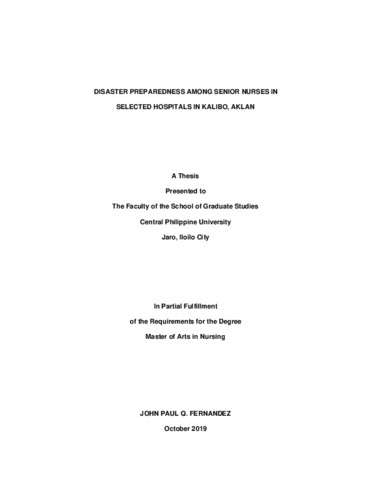Ipakita ang simpleng tala ng item
Disaster preparedness among senior nurses in selected hospitals in Kalibo, Aklan
| dc.contributor.adviser | Yoro, Carolyn L. | |
| dc.contributor.author | Fernandez, John Paul Q. | |
| dc.coverage.spatial | Kalibo | en_US |
| dc.date.accessioned | 2021-02-11T09:01:30Z | |
| dc.date.available | 2021-02-11T09:01:30Z | |
| dc.date.issued | 2019 | |
| dc.identifier.citation | Fernandez, J. P. Q. (2019). Disaster preparedness among senior nurses in selected hospitals in Kalibo, Aklan (Unpublished Master's thesis). Central Philippine University, Jaro, Iloilo City. | en_US |
| dc.identifier.uri | https://hdl.handle.net/20.500.12852/308 | |
| dc.description | Abstract only | en_US |
| dc.description.abstract | Over the years, the Philippines had been devastated by strong typhoons which led to massive flooding in low lying areas particularly in the cities of Metro Manila. As time passed by, these typhoons got stronger and stronger and became alarming. At this state, the people as well as hospitals should be prepared to reduce risks and to solve related problems. With the foregoing situations, nurses must engage in ongoing planning, development, and training on “Disaster Risk Reduction”. As Spellman (2011) said, "The challenge faced by today's nurses is to make sure which discipline-specific expertise are appropriate for an emergency response effort”. The aim of this study was to find out the level of disaster preparedness among senior nurses in selected hospitals in Kalibo, Aklan using a quantitative-descriptive-correlational design. The study utilized a questionnaire/checklist as a main tool in gathering the data. This was adapted from the Hospital Emergency Response Checklist, an all-hazards tool for hospital emergency administrators (WHO, 2011). This instrument was slightly modified by the researcher to suit the present study. In this study, it was found out that majority of the respondents was highly prepared on all seven areas and among those areas, most of the nurses were highly prepared on triage. It was also noteworthy that there is a relationship between the level of preparedness and the number of relevant trainings and seminars attended by the respondents. It is recommended that conducting trainings and staff development may help encourage nurses to keep on striving to maintain a safe workplace during disasters. This is very informative to nurses as frontlines of public health response; and to be familiar and aware of their role for them to effectively respond to a public health emergency. | en_US |
| dc.format.extent | xi, 76 leaves | en_US |
| dc.language.iso | en | en_US |
| dc.subject.ddc | GSL Theses 610.73072 F391 | en_US |
| dc.subject.lcsh | Emergency management | en_US |
| dc.subject.lcsh | Hospitals--Emergency services | en_US |
| dc.subject.lcsh | Hazard mitigation | en_US |
| dc.subject.lcsh | Hospital administrators | en_US |
| dc.subject.lcsh | public health emergency | en_US |
| dc.title | Disaster preparedness among senior nurses in selected hospitals in Kalibo, Aklan | en_US |
| dc.type | Thesis | en_US |
| dc.description.bibliographicalreferences | Includes bibliographical refences | en_US |
| dc.contributor.chair | Alibogha, Salex E. | |
| dc.contributor.committeemember | Baldon, Charlie D. | |
| dc.contributor.committeemember | Sale, Melba C. | |
| dc.contributor.committeemember | Canaman, Tony Ray A. | |
| dc.contributor.department | School of Graduate Studies | en_US |
| dc.description.degree | Master of Arts in Nursing | en_US |
| local.subject | Emergency response | en_US |
| local.subject | Disaster preparedness | en_US |


